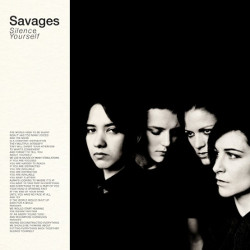|
|
|
|
 |
||
|
|
|
We live in an increasingly enlightened age‚ where the general public is slowly but steadily groping toward acceptance and equality for all‚ but hyper-masculine genres like hip-hop and punk rock still openly accept the exclusionary and the antiquated. To this day‚ descriptors like "best white rapper" and "best female punk group" feel pejorative by nature. But once in a great while‚ the right group can come along and shatter the mold.
Take the Beastie Boys for example. In the 90s‚ Mike D‚ MCA and Ad Rock outgrew their "white rapper" labels‚ and the homophobia and chauvinism that went along with them‚ by writing innovative genre-defying rhymes that were so top-tier‚ people didn't pay attention to what color their skin was. They wrote about egging celebrities‚ going grey‚ and daydreaming on the commute to work while their would be peers rapped about being white ad nauseum. I'm reminded of this every time I listen to Silence Yourself‚ an album rife with enough visceral emotion and raw aggression to avoid being pigeonholed by the Y chromosomes its creators lack. There's nothing overtly feminist about the 11 songs that comprise Silence Yourself because there doesn't need to be. Savages aren't using punk rock as a platform for demanding gender equality because they're not equal to their testosterone fueled peers; they're better.
What's most captivating about the reckless 40 minute joyride that is Silence Yourself is the complete control that the London quartet embodies. From their refusal to allow cameras or cell phones into live shows‚ to the disabled comment sections on their black and white high resolution live videos‚ Savages control every aspect of their image and sound‚ which is no small feat in the digital era. Control is evinced in every frantic breath of "Hit Me‚" when front woman Jehnny Beth tauntingly describes a beating she took as "the best I ever had." It's there in the mock objectification of "City's Full‚" when she declares "there's so many skinny pretty girls around." And it's present in the album's piano ballad swan song "Marshal Dear‚" as Beth slowly twists a knife into the song's namesake with calmly delivered barbs like "I hope you're breathing your last breath‚" and "you will die soon‚ I'll give you a quarter of an hour." Beth receives worthy support from Ayse Hassan's ominous bass lines that drive standouts like "Shut Up" and "Husbands‚" along with guitarist Gemma Thompson and drummer Fay Milton‚ who can erupt into outbursts of blissfully chaotic noise at any given moment. Listening to Silence Yourself feels like being on the ground floor of something very special; it's an astonishing debut that at once ignites a conversation about the role of women in punk rock and introduces a band talented enough to make that same conversation irrelevant in the very near future.
suggestions
Shows: Newport Folk Festival 2010
Blog: Song of the Day: "Izabella" - Jimi Hendrix
Podcast: State of Mind Radio: Episode 23
Shows: Nateva
Features: Chasing the Magical Sound in My Head: Sam Cohen of Yellowbirds
More on: Savages
Shows: Newport Folk Festival 2010
Blog: Song of the Day: "Izabella" - Jimi Hendrix
Podcast: State of Mind Radio: Episode 23
Shows: Nateva
Features: Chasing the Magical Sound in My Head: Sam Cohen of Yellowbirds
More on: Savages
new to state of mind
Shows: moe.
Shows: Yonder Mountain String Band
Shows: Grand Point North 2014
Shows: Catskill Chill 2014
Shows: moe.down 15
Shows: Gov't Mule
Shows: Umphrey's McGee
Shows: Newport Folk Festival 2014
Shows: Widespread Panic
Albums: Phish - Fuego
Shows: moe.
Shows: Yonder Mountain String Band
Shows: Grand Point North 2014
Shows: Catskill Chill 2014
Shows: moe.down 15
Shows: Gov't Mule
Shows: Umphrey's McGee
Shows: Newport Folk Festival 2014
Shows: Widespread Panic
Albums: Phish - Fuego
random awesomeness
Blog: Mountain Oasis welcomes NIN‚ Bassnectar and Pretty Lights
Shows: These United States + Trampled By Turtles
Shows: snoe.down 2010
Albums: Cochemea Gastelum - The Electric Sound of Johnny Arrow
Features: Al Schnier of moe. talks to Doug McCombs of Tortoise
Shows: Drive-By Truckers
Shows: Medeski Martin and Wood & Antibalas
Blog: NY Times Wants Your Dead Photos
Blog: Al and the Transamericans: Live Stream Tonight from Narrows Center
Blog: Funky Monday: Les McCann & Eddie Harris - "Compared to What"
Blog: Mountain Oasis welcomes NIN‚ Bassnectar and Pretty Lights
Shows: These United States + Trampled By Turtles
Shows: snoe.down 2010
Albums: Cochemea Gastelum - The Electric Sound of Johnny Arrow
Features: Al Schnier of moe. talks to Doug McCombs of Tortoise
Shows: Drive-By Truckers
Shows: Medeski Martin and Wood & Antibalas
Blog: NY Times Wants Your Dead Photos
Blog: Al and the Transamericans: Live Stream Tonight from Narrows Center
Blog: Funky Monday: Les McCann & Eddie Harris - "Compared to What"
